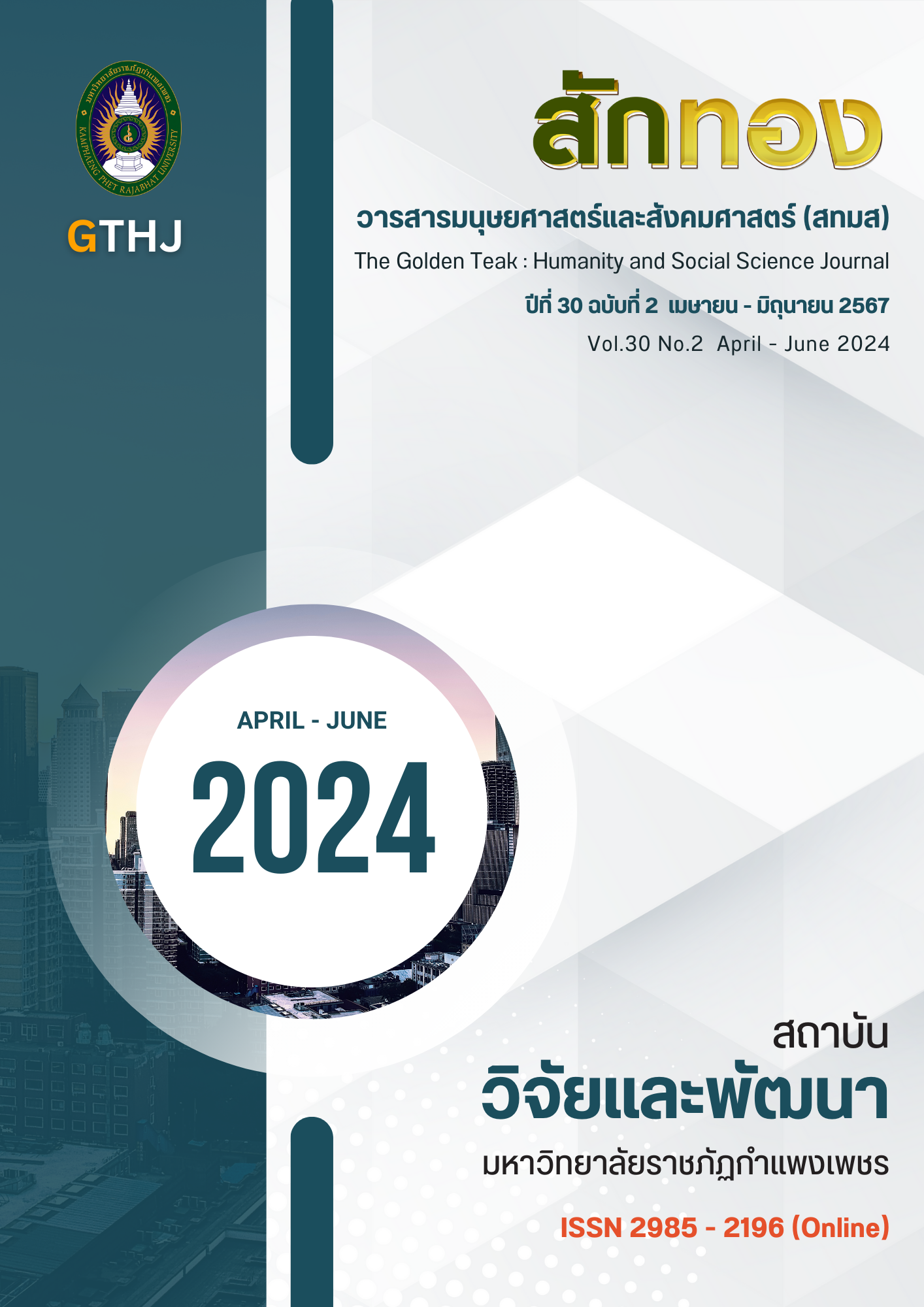Evaluating Service Quality and The SHA Standard in Creative Community-Based Tourism Amidst the COVID-19 Pandemic: A Case Study of Takhian Tia Community in Bang Lamung District, Chonburi Province
Main Article Content
Abstract
This study aimed to Evaluating Service Quality and The SHA Standard in Creative Community-Based Tourism Amidst the COVID-19 Pandemic: A Case Study of Takhian Tia Community in Bang Lamung District, Chonburi Province. The assessment was conducted using the five dimensions of service quality: tangibility, reliability, responsiveness, assurance, and empathy, as defined along with adherence to the Amazing Thailand Safety & Health Administration
(SHA) standards.To establish a comprehensive understanding, a sample of 305 tourists who had visited the Takhian Tia community during the pandemic was selected. The sample size was determined employing the G*Power program, particularly useful when dealing with uncertain tourist counts or infinite populations. Data collection was carried out through the distribution of structured questionnaires to the chosen participants. The findings of this research revealed that the overall service quality of creative community based tourism in Takhian Tia community during the pandemic was rated positively. Notably, the dimension of assurance, which encompasses effective communication, achieved an aboveaveragerating. When assessing service quality in alignment with the Amazing Thailand SHA standards, the results indicated a moderate level of compliance. It is worth highlighting that the aspect of educating tourists about mitigating the risks associated with COVID-19, through local tourism stakeholders or public relations materials, received the lowest average rating. In conclusion, this study underscores the commendable quality of service within the context of creative community-based tourism in Takhian Tia community, even amidst the challenges posed by the COVID-19 pandemic. Nonetheless, there is room for improvement in aligning the services with the health and safety guidelines specified by the Amazing Thailand SHA standards, particularly in terms of enhancing educational efforts to minimize the potential spread of the virus. This research sheds light on the crucial intersection of service quality, community-based tourism, and public health considerations, serving as a valuable reference for stakeholders and practitioners in the field.
Article Details

This work is licensed under a Creative Commons Attribution-NonCommercial-NoDerivatives 4.0 International License.
บทความที่ได้รับการตีพิมพ์เป็นลิขสิทธิ์ของวารสาร สักทอง : วารสารมนุษยศาสตร์และสังคมศาสตร์ สถาบันวิจัยและพัฒนา มหาวิทยาลับราชภัฏกำแพงเพชร
ข้อคิดเห็นใดๆ ที่ปรากฎในวารสารเป็นวรรณกรรมของผู้เขียนโดยเฉพาะ ซึ่งมหาวิทยาลัยราชภัฏกำแพงเพชรและบรรณาธิการไม่จำเป็นต้องเห็นด้วย
References
Choibamroong, T. (2021). Normalcy in the New Normal : Thai Tourism in an Emergency Situation. Bangkok : SuperiorPrinting House. [in Thai]
Kaewnuch, K. (2021). Tourism Management and Tourism Community Development under Global Dynamics. Bangkok : FreeMind Publishing. [in Thai]
Kokkhangplu, A. & Kaewnuch, K. (2022). Model for Quality of Life Enhancement in Community-Based Tourism by Understanding Factors Influencing Social Inequalities. Doctoral dissertation, National Institute of Development Administration. [in Thai]
Luang Chan Duang, F. (2018). The potential of role-model communities in sustainable and creativetourism. Ph.D. Applied Economics Maejo University. [in Thai]
Ministry of Tourism and Sports & Tourism Authority of Thailand. (2017). Tourism of the main tourist destinations: Don’t be too big. TAT Review, 3(3), 24-31. [in Thai]
Ministry of Tourism and Sports & Tourism Authority of Thailand. (2022). National Tourism Development Plan No. 3. [Online]. Available : https://drive.google.com/file/d/12-qp4UFjmLAkks2_UW3ux2SB8bh_Umpg/view [2022, January 9]. [in Thai]
Onputtha, S., Proykratok, W., Issaranura Na Ayuthaya, V., & Jomnonkwao, S. (2023). Service Quality Influencing Value Perception and Traveling Decision: Mutelu Gen Z Tourists. Siam Academic Review, 24(1), 75-94. [in Thai]
Parasuraman, A., Zeithaml, V.A. & Berry, L.L. (1985). A conceptual model of service quality and its implications for future research. Journal of marketing, 49(4), 41-50.
Prasongtun, S. (2013). Social Capital and Creative Community-Based Tourism Promotion : A Case Study of Thai Phuan People, Pakplee District, Nakhon Nayok Province. Bangkok : Thammasat University. [in Thai]
Schwab, K. (2022). World Economic Forum 2019. [Online]. Available : https://www3.weforum.org/docs/ WEF_TheGlobalCompetitivenessReport2019.pdf [2022, July 7].
Sermsri, S. & Kaewnuch, K. (2013). A Study of Thai Tourists Expectation and Satisfaction towards the Environmental Management in the Area of Mae Ram Phung Beach, Rayong Province. Journal of International and Thai Tourism, 9(2), 1-11. [in Thai]
Somkhuan, P., Weerasophon, W. & Srikos, B. (2022). Standardization and Confidence in the Servive of Small Hotels in Bangkok after the COVID-19 Situation. Journal of SaengKhomKham Buddhist Studies, 7(2), 247-262. [in Thai]
Soonthonsmai, V. (2020). A Causal Model of Satisfaction on Service Quality of Health Tourism in Scandinavian Aging Tourists in Thailand. Academic Journal of Humanities and Social Sciences Burapha University, 28(1), 244-268. [in Thai]
TAT Intelligence Center. (2021). 2nd Quarter Report: Survey of Travel Behavior of Thai People in 2022. [Online]. Available : https://intelligencecenter.tat.or.th/articles/44791 [2022, July 7]. [in Thai]
The Designated Areas for Sustainable Tourism Administration (Public Organization). (2018). Creative and Sustainable Tourism Management Project. Bangkok : The Designated Areas for Sustainable Tourism Administration (Public Organization). [in Thai]
Toh-it, M., Thamphauk, W., Janduang, S. & Kongrode, J. (2022). The Effects of Service Quality on Customer Satisfaction of the Amazing Thailand Safety and Health Administration (SHA) Hotel in Hat Yai District, Songkhla Province. Journal Name : Research and Development Journal Loei Rajabhat University, 17(61), 46-55. [in Thai]
Tourism Authority of Thailand. (2020), Amazing Thailand Safety and Health Administration (SHA). [Online]. Available : https://thailandsha.com/file/Work%20Manual_for_the_ Sanitation_and_Safety_Standard_Project_th.pdf [2022, January 9]. [in Thai]
UNWTO. (2021). UNWTO World Tourism Barometer and Statistical Annex. UNWTO World Tourism Barometer (English version), 21(2).
Wisutthilak, S., Saipun, P., Tepalakun, A. & Sindecharuk, T. (2011). Creative Tourism : A Key Tool Leading to Sustainable Communities. Bangkok : Thammasat University. [in Thai]


